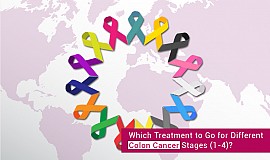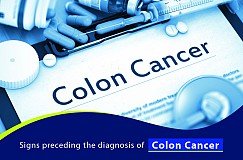Colon Cancer Overview
Colon cancer is a colloquial term used to describe colorectal cancer, or bowel cancer. Colon cancer is caused due to abnormalities in the normal cells located in the lining of the colon. These malignant cells grow out of control, forming clusters called tumors.
The malign nature of the cells also means that they can potentially grow and spread out to distant parts of the body via infiltrating nearby organs, blood vessels or lymph vessels. Apart from the malignant tumors, there is one more kind of tumor, which can grow out of proportion, but not spread to other organs. Such cancerous tumors are called benign tumors.
Colon is part of the intestines which consists of the small intestine (the section between the stomach and the appendix) and the large intestine (from the appendix to the anus). The large intestine is divided into the long colon and a short rectum, just before the anus.
Two thirds of colorectal cancer, or bowel cancer occur in the colon and one third in the rectum, with very few cases of cancer originating in the small intestine.
linkRisk Factors
Lack of proper nutrition is one of the major factors that can lead to a number of diseases, including cancer. Apart from the lack of a balanced diet, excessive intake of alcohol or drugs may also make a person highly susceptible to abnormalities in cellular functions. Following are some of the major factors that can lead to colon cancer:
- Age: Like other cancers, colon cancer risk increases with age (over 50).
- Obesity: If you are overweight, your risk of colon cancer increases.
- Alcohol: High alcohol intake is also known to increase the risk of cancer.
- Family history: If you have a family member with colon cancer then you are at the risk of cancer.
- Radiation: Being exposed to harsh radiation can also lead to cancer.
linkWhat are the Signs and Symptoms of Colon Cancer?
In the earlier stages, colon cancer doesn’t show any noticeable signs or symptoms, but, there are a variety of known symptoms that become much more apparent as the disease starts to progress in the body. Some of the noticeable symptoms of colon cancer are:
- Chronic diarrhoea or constipation.
- Traces of blood in the faeces (may or may not be visible).
- Blockage in the bowel, and changes in consistency of stool.
- A lump in the back passage or abdomen.
- Low level of red blood cells and iron deficiency.
- Persistent abdominal discomfort, such as cramps, gas or pain.
- Feeling that your bowel doesn't empty completely.
- Weakness or fatigue and unexplained weight loss.
linkPrevention
Cancer can be caused by a single factor, or by a combination of many. Nonetheless, there are a few things that people can implement in their daily lives to avoid cancer.
- Eat a variety of fruits, vegetables and whole grains.
- Avoiding excessive consumption of alcohol.
- Stop smoking.
- Maintain a healthy weight by exercising regularly.
- According to research, the use of aspirin is linked with reduced polyps and colon cancer.
- Regular check ups should be done if the person has in their family who has dealt, or is dealing with cancer.
Cancer Diagnosis
Regardless of the type of disease, its timely diagnosis is essential for its timely cure. Unfortunately, many people are diagnosed with later stages of cancer just because they don’t follow a proper medical check-up regime. A cancer diagnosis finds out the presence of cancerous tumors in the body, its location, size and its type.
Getting a proper medical referral is the first step in colon cancer treatment, and following are some of the most popular means of diagnosing the presence of cancerous tumors in the body:
- Checking for blood in the faeces is one of the simplest diagnostic measures used to test for colon cancer.
- Sigmoidoscopy: A more accurate but less pleasant method is sigmoidoscopy in which a flexible optical device is used to examine the inside of the rectum and colon.
- Colonoscopy: It is used to visually examine the inside of the colon. Usually, a barium enema is used to take an x-ray of the shape of the inside of the bowel.
- Other techniques such as CT scanning or ultrasound can also be used to diagnose the spread of the cancer.
What are the Types of Colon Cancer
In the majority of cases, colorectal cancers initially start on the inner lining of the colon or the rectum. They start as growths, called polyps. Not all polyps grow into cancer, and if they do, the process usually takes many years. Following are some of the most common types of cancerous tumors that are found on the colon and rectum:
- Adenocarcinoma: Forms in mucus-secreting glands of the body. Most common form of colon cancer (95%).
- Neuroendocrine tumors: Also called Hindgut Carcinoid Tumors. These are slow growing tumors, and usually originates in the digestive tract.
- Gastrointestinal Stromal Tumors: These are rare tumors that represent only about 0.1% of all colon and rectal cancer cases.
- Lymphoma: These are also rare tumors, and constitute only 0.2-1.2% of all colon cancer cases.
Stages of Colon Cancer
- Stage 0: This stage signifies that the cancerous tumor has not grown out of the innermost layer of the colon lining called mucosa.
- Stage 1: In this stage the cancerous tumor has grown out of mucosa to the next layer of the colon - submucosa. The tumor hasn’t spread to the lymph nodes.
-
Stage 2: In this stage the cancerous tumor has grown beyond the mucosa and submucosa. Stage 2 of colon cancer is further subdivided into three parts:
- 2A: Tumor has reached the outermost layer of the colon, but hasn’t penetrated it. It also hasn’t spread to the nearby tissues or lymph nodes.
- 2B: The tumor has grown out of the outermost layer of the colon, to the visceral peritoneum (membrane that holds organs in place). The tumor hasn’t spread to the nearby tissues or lymph nodes.
- 2C: Tumor has infiltrated the nearby organs, but hasn’t spread to the nearby lymph nodes.
-
Stage 3: Like the Stage 2 of Colon Cancer, Stage 3 is also classified under three stages:
- 3A: The cancerous tumor has grown beyond the muscular layers of the colon. It has spread to the nearby lymph nodes, but hasn’t spread to distant lymph nodes or organs.
-
3B: The cancerous tumor has grown beyond the outermost layer of the colon. It has invaded visceral peritoneum, or has invaded other organs, or is found in 1-3 lymph nodes.
OR, the cancerous tumor hasn’t penetrated the outermost layer, but has spread to 4 or more lymph nodes. - 3C: The cancerous tumor has penetrated the outermost layer of the colon. It has spread to 4, or more than 4 lymph nodes, but hasn’t spread to any distant lymph nodes or organs.
-
Stage 4: this stage of colon cancer progression is classified into two categories:
- 4A: under this stage the cancer has spread to one distant organ like liver or lungs.
- 4B: this is the most advanced stage of colon cancer, and this stage signifies that the cancer has spread to one or more distant organs like the liver and lungs.
What is the Best treatment for colon cancer?
Treating colon cancer will largely depend on the progression of the cancer in the body, the size of the cancerous tumor, its type, and its location.
People who are diagnosed with colon cancer during early stages usually opt for surgical removal of the cancerous tumor, as the main and first step of cancer treatment. After the surgery, the doctor may recommend chemotherapy to reduce the chances of cancer’s recurrence.
How Does Immunotherapy Treat Colon Cancer?
At Cancer Healer Center, we treat colon cancer without surgery, chemotherapy or radiation therapy. Our unique, proven treatment for colon cancer is based on immunotherapy, and is aptly named Cancer Healer Therapy.
Working according to the principles of Immunotherapy, Cancer Healer Therapy boosts the patient's immune system, to fight against the disease without any major side effects like - hair loss, damage to normal cells, bone loss, weight loss etc.
The treatment for bowel cancer, and colon cancer will vary according to the type of cancerous tumor, its location and the overall progression of the disease in the body.
The treatment for bowel cancer, and colon cancer via immunotherapy depends on the following factors:
- The type of cancer, its location, and its progression in the body.
- The type of immunotherapy that the doctor has opted for.
- Side effects, which have been carried over from the previous treatment, if any.
At Cancer Healer Center we provide care for patients suffering from all stages (even advanced bowel cancer), and all types of cancers (primary or metastatic).
With Cancer Healer Therapy we treat colon cancer with great success, and our treatment can be used as a standalone means of curing cancer, or it in conjunction with other cancer treatments.
Recurrent Colon Cancer
Recurrent cancer means that the cancer has come back after the success of the initial treatment. Recurrent cancer usually affects the initial place of origin, or is diagnosed at distant organs. A thorough round of diagnostic measure is the first step towards treating recurrent colorectal cancer.
The treatment of recurrent cancer depends on the site where the cancer has recurred. In case of local recurrent cancer, the treatment will more or less remain the same, but in the case of distant recurrences, the treatment will vary accordingly.
Get all the additional information and treatment options for Colon or Bowel Cancer in India, at Cancer Healer Center, where Dr. Tarang Krishna's team of dedicated medical experts, make sure that the cancer patients get all the necessary treatment they require to overcome and beat cancer once and for all. For more details contact us now and book your appointment.
Thanks you cancer healer center. Your clinic helped my brother to get recovered from the colon cancer. And your medicine are really effective. Thanks to you, now I can see my brother with a big smile on face.
After I was diagnosed with Stage 3A, colon cancer, I was advised for chemotherapy/radiation. I did a lot of research and decided to go for Cancer Healer because at least there were less side effects in Immunotherapy, and then after starting treatment I found myself recovering at a good pace. Thanks to god.








